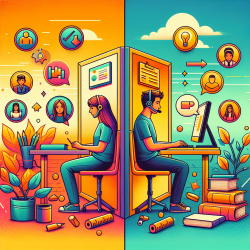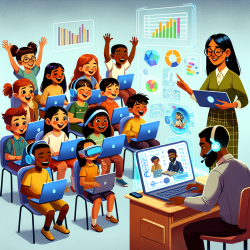As school counselors, you stand at the forefront of educational support, navigating the complexities of student needs, Individualized Education Programs (IEP), and the ever-growing demands of the educational landscape. In recent times, the feeling of being burnt out has become all too familiar for many in the profession. The weight of these responsibilities, coupled with the traditional constraints of time and resources, can leave even the most passionate professionals feeling drained and seeking rejuvenation. It's in this context that the potential of telepractice emerges not just as a tool, but as a transformative approach to school counseling, particularly in the realm of IEP management and execution.
Telepractice, or the delivery of counseling and therapy services via telecommunications technology, presents a novel avenue for growth and inspiration. This approach can significantly mitigate feelings of burnout by offering flexibility, reducing time spent on logistics, and enabling counselors to focus on what truly matters—supporting students' educational journeys.
Addressing Burnout with Telepractice
Burnout among school counselors is often the result of repetitive stressors: heavy caseloads, administrative tasks, and the emotional toll of supporting students through their challenges. Telepractice introduces a level of efficiency and accessibility that traditional methods struggle to match. By transitioning IEP meetings, counseling sessions, and even professional development to an online format, counselors can reclaim valuable time, reduce physical and emotional exhaustion, and improve their work-life balance.
Enhancing IEP Management through Telepractice
IEP management is a critical component of school counseling, requiring meticulous attention to detail, collaboration with educators and parents, and a deep understanding of each student's unique needs. Telepractice can streamline these processes in several ways:
- Increased Collaboration: Virtual meetings can facilitate easier collaboration among IEP team members, including teachers, therapists, and parents, who may have found it challenging to attend in-person meetings due to scheduling conflicts or geographical barriers.
- Accessibility of Documentation: Telepractice platforms often include features for sharing and reviewing documents in real-time, ensuring that all team members have access to the most current IEP documents, assessments, and progress reports.
- Personalized Student Support: Teletherapy services, a subset of telepractice, allow for tailored therapeutic interventions that align with IEP goals, delivered in a familiar and comfortable setting for the student.
Growing Knowledge and Skills
The shift towards telepractice also offers a unique opportunity for professional growth. Engaging in telepractice requires the development of new skills—both technical and interpersonal. School counselors can expand their knowledge through specialized training in telepractice methodologies, learning how to effectively use technology to engage students, conduct assessments, and collaborate with colleagues and families online. This pursuit of continuous learning not only combats feelings of stagnation but also positions counselors as leaders in the adoption of innovative practices within their schools.
Overcoming Challenges
While telepractice offers numerous benefits, its implementation is not without challenges. Concerns regarding equity of access to technology, ensuring confidentiality and privacy in a digital environment, and adapting counseling techniques to an online format are valid. However, these challenges also serve as catalysts for growth and innovation within the field. By addressing these issues head-on, school counselors can develop comprehensive strategies that ensure all students receive the support they need, regardless of their circumstances.
Inspiration through Innovation
The integration of telepractice into school counseling signifies a shift towards a more flexible, accessible, and efficient model of support—one that has the potential to reinvigorate professionals and enhance the educational experience for students. As counselors embrace telepractice, they not only find solutions to current challenges but also pave the way for future advancements in educational support services.
In conclusion, the journey from feeling burnt out to inspired may seem daunting, but it is a path filled with opportunities for growth, innovation, and renewed passion for the profession. By embracing telepractice, school counselors can transform the landscape of IEP management and student support, emerging as rejuvenated professionals ready to tackle the challenges of modern education with confidence and creativity.










